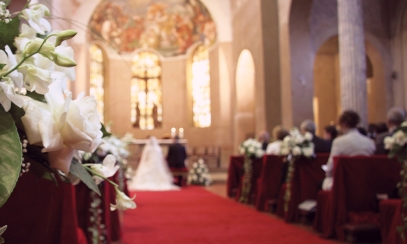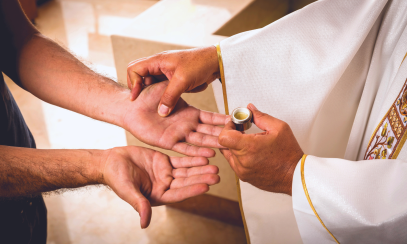
Cleansed through Christ: The Sacrament of Baptism
The sacraments of initiation “ground the common vocation of all Christ's disciples, a vocation to holiness and to the mission of evangelizing the world. They confer the graces needed for the life according to the Spirit during this life as pilgrims on the march towards the homeland.” (Catechism of the Catholic Church 1533) Baptism is often called the “door to the Church,” or the gate which gives access to the other sacraments. It is that, and so much more.
The sacraments of initiation “ground the common vocation of all Christ's disciples, a vocation to holiness and to the mission of evangelizing the world. They confer the graces needed for the life according to the Spirit during this life as pilgrims on the march towards the homeland.” (Catechism of the Catholic Church 1533) Baptism is often called the “door to the Church,” or the gate which gives access to the other sacraments. It is that, and so much more.
This is the second post in our series exploring the seven sacraments of the Catholic Church. Check out a brief overview of all seven sacraments here.
Why do Catholics baptize people?
Baptism (from the Greek word baptisma, a “dipping”) is the sacrament in which, by water and the power of the Holy Spirit, a person is cleansed of all sin, including original sin inherited from Adam and Eve, and experiences birth into the new life of Christ. Through baptism, we become members of the body of Christ, his Church, and share in the mission of the Church: calling all to the love of Christ and taking part in building up the kingdom of God on earth.
Jesus himself was baptized by John the Baptist in the River Jordan, marking the beginning of his public ministry. It is in baptism that one “puts on Christ.” (Gal 3:27) Baptism is a bath that purifies, justifies and sanctifies, through the action of the Holy Spirit. Without this washing, no one “can enter the kingdom of God.” (Jn 3:5)
Who can be baptized?
Any person of any age who has not been baptized before can receive the sacrament of baptism. Usually, adults and children over the age of reason (about 7) are baptized during the Easter Vigil Mass. Infant baptisms can occur at any time. Because baptism leaves an indelible (not able to be erased) mark on the soul, we don’t re-baptize anyone who has had a Christian baptism that involved water and the words of baptism. Catholics recognize most other Christian baptisms.
What happens during Catholic baptism?
At the beginning of the baptism rite, the priest anoints the one to be baptized with the oil of catechumens, which strengthens him or her and protects from evil and sin. After the person is baptized, the priest anoints him or her with sacred chrism.
Traditionally, infants being baptized have worn white “christening” gowns. In many Catholic parishes, an infant is given a small white garment, often embellished with symbols of baptism, signifying that the newly baptized has “put on Christ.” (Gal 3:27) When adults are baptized at the Easter Vigil, they, too, wear white garments after immersion in water.
Following the anointing, the newly baptized (or the sponsor in the case of an infant) is handed a candle lit from the paschal candle. It signifies that the light of Christ has enlightened this new Christian, and the neophyte (the formal word for the newly baptized) has become, with Christ, the “light of the world.”
Whether it’s a child or an adult being baptized, sponsors — or godparents — are an important part of the process. They are there for all the important moments of the new Christian’s life, and help strengthen them in the faith. During the actual baptism, sponsors take an active role, “standing up for” the person being baptized. This primarily involves promising to guide the person in faith, and standing with the person to be baptized at the moment of baptism.
The biblical basis for baptism
But why is baptism required? In Matthew 28:19, Jesus commanded the Apostles:
"Go, therefore, and make disciples of all nations, baptizing them in the name of the Father, and of the Son, and of the holy Spirit..."



